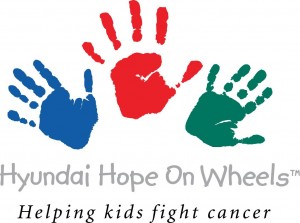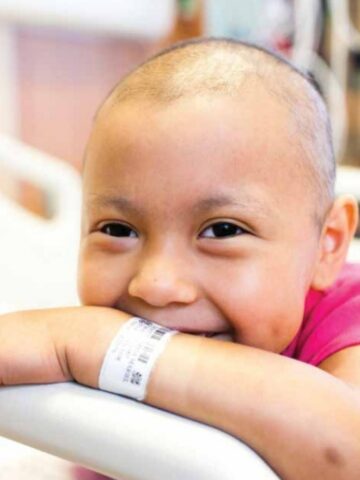 A $10 million donation to CHOC from Hyundai Motor America, the largest corporate gift in the hospital’s history, will be used to fund ground-breaking pediatric cancer research, including the latest advances in genomic medicine. Kim Cripe, CHOC president and CEO, Oscar Leeser, Chairman of the Hyundai Hope on Wheels Foundation, Dr. Leonard Sender, medical director of the Hyundai Cancer Institute at CHOC, and John Krafcik, president and CEO of Hyundai Motor America, gathered for the check presentation in May 2011.
A $10 million donation to CHOC from Hyundai Motor America, the largest corporate gift in the hospital’s history, will be used to fund ground-breaking pediatric cancer research, including the latest advances in genomic medicine. Kim Cripe, CHOC president and CEO, Oscar Leeser, Chairman of the Hyundai Hope on Wheels Foundation, Dr. Leonard Sender, medical director of the Hyundai Cancer Institute at CHOC, and John Krafcik, president and CEO of Hyundai Motor America, gathered for the check presentation in May 2011.
The Hyundai Cancer Institute at CHOC has enrolled the first patients in a pilot study designed to determine the individual genome profile of a range of pediatric and young adult cancers in the hope of advancing new and more effective treatments for recurrent or refractory disease in this patient population. The commercial availability of cost-effective, whole genome and RNA sequencing technology is making possible the development of individual molecular profiles that one day will allow physicians to “personalize” treatment regimens to target a patient’s specific cancer. Both germ-line and tumor samples from individual patients will be studied.
The results of this pilot study may not have a direct clinical impact, yet genomic medicine promises to take the concept of personalized oncology treatment to unprecedented levels. Molecular profile analysis may ultimately identify oncogenic pathways for which a chemotherapeutic agent already exists or for new ones to be developed.
Phase I Trial for DFMO and Neuroblastoma
Genomic research is just one type of the exciting pediatric cancer studies taking place at CHOC. We are also the only California hospital participating in a four-center, Phase I clinical trial investigating the potential role of alpha–difluoromethylornithine (DFMO) as a chemoprevention agent for refractory or recurrent neuroblastoma. DFMO, a watersoluable drug associated with low toxicity, has already been shown to reduce the risk of colon cancer. The Phase I study is further assessing toxicity to determine the maximal tolerated dose.
It is essentially a new look at a decades-old drug, which was approved in the 1970s for treating African trypanosomiasis or “sleeping sickness.” But in 2008, research conducted by Frank Meyskens, M.D., director of the Chao Family Comprehensive Cancer Center at the University of California, Irvine, showed DFMO reduced the risk of recurrent colorectal adenomas by up to 95 percent—and with less toxicity than conventional chemotherapy. In fact, an analysis of side effects and toxicity found no difference between the DFMO and placebo groups.
The current Phase 1 study is testing DFMO as a single agent and in combination with etoposide, a semisynthetic podophyllotoxin-derived antineoplastic agent. According to Leonard Sender, M.D., medical director of the Hyundai Cancer Institute at CHOC, DFMO specifically targets ornithine decarboxylase (ODC), a protein found in high levels in neuroblastoma tumor cell lines associated with poor outcomes. Previous studies involving both cell lines and mouse models have shown that DFMO can inhibit ODC levels. The other centers participating in this Phase I study are the University of Hawaii, University of Arizona and the Van Andel Institute.
“We are very proud to be part of this study, working with one of the premiere researchers, and bringing the best of basic science to the bedside of our patients,” Dr. Sender said. “Neuroblastoma is very aggressive. That DFMO may potentially have a role in treating neuroblastoma is very exciting. It would be fantastic to have a drug with a low toxicity profile.”
For more information about cancer research at CHOC, please visit www.choc.org.




